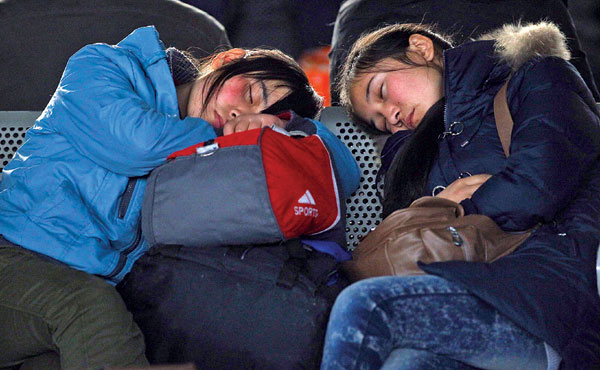 |
|
|
|
|||||||||||
The level of happiness and life satisfaction for migrant workers, especially young migrants, are not directly correlated with the economic strength of the cities where they work, a new survey showed.
The four Chinese cities with the highest GDP- Shanghai, Beijing, Guangzhou and Shenzhen - are among the bottom eight in a ranking of 20 cities in the country based on how migrant workers feel about their lives.
Migrant workers in Shenzhen were the least happy, according to the survey, released on Tuesday.
In contrast, Quanzhou, a port city in Fujian province, was first on the list despite ranking 25th in GDP among Chinese cities last year.
|
 Two women catch up on thier sleep before boarding their train at Beijing West Railway Station on Jan 5, 2012. The level of happiness and life satisfaction for migrant workers, especially young migrants, are not directly correlated with the economic strength of the cities where they work, a new survey showed. [Photo Zou Hong/China Daily] |
More than 2,473 migrant workers from 20 cities were polled by phone for the survey, which was jointly conducted by the Department of Psychology at Renmin University of China .
About 30 percent of the migrant workers interviewed said that they feel isolated and rejected by the cities, but 46.2 percent indicated they will continue to work at their present location, while 23.3 percent responded that they would like to leave for another city.
In addition, more than 68 percent of the second generation of migrant workers, or those who are younger than 25 years old, felt they belong to the underclass in the cities, the survey said.Migrant workers in megacities always face greater competition, higher demands from their jobs and higher living costs, said Li Jiuxin .
Wang Zhitang, a 38-year-old migrant worker from Shanxi province, has been working as a gatekeeper at a university in Beijing since 1995.
But he plans to return to his hometown with his wife and son this year or the next.
"Compared with the high cost of living in Beijing, the 2,000 yuan ($317) I make each month is insufficient, but there's nothing I can do," he said.
Wang said he considered looking for a job in a factory in Beijing, but "the factories favor young workers who can learn faster".
"There is discrimination against migrant workers, even though they play an important role in cities," said Feng Tongqing, a labor professor at the China Institute of Industrial Relations.
For example, the difficulty in obtaining permanent residence permits in the cities denies migrant workers the same social benefits, such as education, as local residents.
Wu Daozhen, went to Quanzhou from Anhui province in 2006. He now works at a clothing factory in Nan'an, a city under Quanzhou's administration.
He said he generally feels happy about his work and life in the city, including the salary and housing provided by his employer.
Wu's biggest concern is about his son's education.
zhengjinran@chinadaily.com.cn